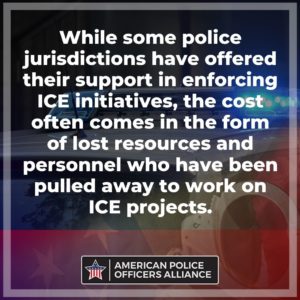Today’s political climate has seen a rise in focus on immigration enforcement in many areas of the U.S. The U.S. Immigration and Customs Enforcement, a federal law enforcement agency operating under the Department of Homeland Security, is tasked with enforcing immigration regulations and preventing transnational crime. Often, this work is supplemented with support from local sheriff and police jurisdictions — but at a cost.
While some jurisdictions have offered their support in enforcing ICE initiatives, the cost often comes in the form of lost resources and personnel who have been pulled away to work on ICE projects.
When a local jurisdiction is enlisted to assist ICE with enforcing immigration law, several facets of everyday operations are taken up. Law enforcement officers may be pulled away to assist with the enforcement of warrants and detainment of illegal immigrants. Holding facilities and jails may have space taken up for ICE agents to detain those who are found to be in the country illegally until further action can be taken. The local citizens of these jurisdictions often find themselves losing trust in local police if they work with ICE, which has a surly reputation for murky boundaries and ever-shifting policies.

All of these can cause further reaching issues with police and sheriff’s offices. Some cities, operating under sanctuary city laws, have flat out refused to help ICE in its efforts, others have only offered up assistance in cases of violent or extreme/dangerous crime. In contrast, other jurisdictions have dedicated the full services of their staff to assist the efforts of ICE.
ICE has formal agreements, known as 287(g) agreements, with 75 cities and counties throughout the country that enable local law enforcement to assist ICE agents. Another program, a Warrant Service Officer (WSO) program, allows sheriffs and police officers who obtain this certification to make immigration-related arrests, furthering a cooperative partnership between ICE and local law enforcement.
However, many areas do feel that these efforts are unfair. Aside from citizens’ personal feelings on the actions of ICE and immgration laws in general, they often feel that the assistance of local jurisdictions is an unfair use of resources that are otherwise limited. Whether it’s low staffing, large areas of territory to cover, or a frequency of higher profile or more threatening crime, often the use of local resources for ICE purposes does more harm than good when it comes to citizen approval.
When coupled with the generally poor reputation of ICE and its agents, which are often described as lacking boundaries and shifting policies to fit current needs or behaviors, there is a lot of potential fallout that can occur when a local office is involved with immigration enforcement. This can have detrimental effects on many aspects of local operations, including leading to a lack of voter support in future election cycles.
Furthermore, it’s the opinion of many that unless violent or serious crimes are committed, there are other solutions to the so-called immigration problem in the U.S. And while ICE may be tasked with enforcing the law, this may often be something that local officers don’t wish to be involved with. Particularly in areas where crime is prevalent, focusing on keeping a community safe and crime free should be the utmost priority for local law enforcement. Spreading resources, many of which are already limited, can be damaging for a community and the effects can reach far into the future.
The rates for property and violent crimes are soaring across many parts of the United States. This is concerning for police officers who are out there trying to protect their communities, especially for those officers that are working to protect the most dangerous cities across the country. Find out the most dangerous cities for police officers here.










